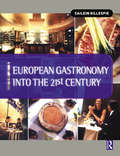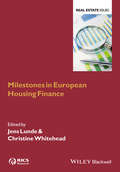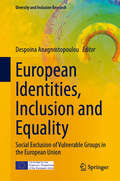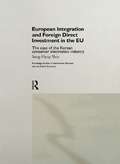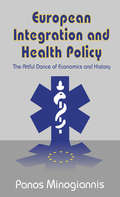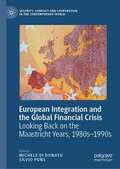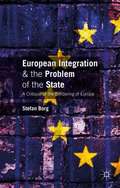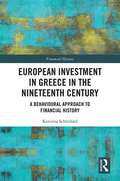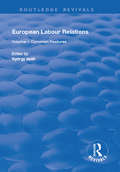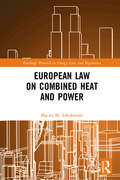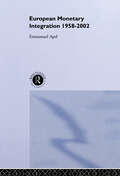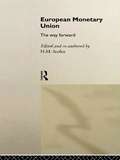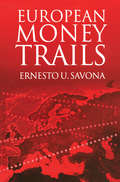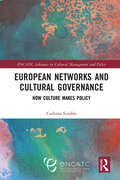- Table View
- List View
European Energy Markets Observatory
by Colette LewinerThe twelfth edition of the European Energy Markets Observatory covers the full year 2009 and the winter 2009/2010. Key messages developed in the report include the following: -New energy trends are emerging after the crisis. -The crisis and some new investments resulted in an improved security of supply. -There has been little progress towards the creation of a single European energy market. -EU greenhouse gas emissions reduction objective will be met, but renewables and energy efficiency targets are a challenge. -Generation mix and customers' behavioral changes are calling for smart grids. -Utilities are focusing on reducing their debts.
European Financial Integration
by Christopher M. Bruner Rawi AbdelalProvides background on the history and status of financial integration in the European Union. Describes the pertinent treaty-based "fundamental freedoms," emphasizes challenges to further cross-border consolidation in the banking sector, and examines the regulatory role of the European Commission in fostering conditions conducive to further financial integration.
European Forest Policy and Governance: An Integrative Analytical Framework
by Filip AggestamThis book provides a state-of-the-art overview covering distinct and relevant aspects of forest policy processes in Europe, presenting a fresh perspective on different analytical approaches, theories, and frameworks.Set against the background of a changing world, driven by significant social, environmental, and economic developments, in Europe and elsewhere, there is a growing need for an improved understanding of forest governance and how to analyse the forest policymaking processes. This book introduces the reader to some of the key issues typically encountered in reviewing proposed as well as established forest policies, focusing on five socially relevant topics for the forest-based sector today, namely: European forest governance under a green new deal Systemic changes and the circular (bio-)economy Social changes connected with forest ownership and forest actors Nature conservation and the pursuit of multifunctional forests Living with forest fires and climate change. In so doing, this book presents a set of timely and rich case studies relevant to the study of forest governance. In the final chapter, it puts forward an innovative and systematic method for selecting the most appropriate analytical tool that accounts for the constraints and objectives involved in monitoring forest policy. The book is accompanied by chapter-level exercises and online Support Material which details the various approaches, theories, and frameworks discussed in the book, providing direct links back to individual chapters, discussion points, and a step-by-step guide for how each method can be applied.This book will be an essential read for forestry students and scholars, and professionals and policymakers working on forest policy and forest management.
European Gastronomy into the 21st Century
by John Cousins Cailein GillespieGastronomy is the art and science of good eating and drinking: a concept that extends outwards to embrace wider notions of tradition, culture, society and civilisation. This book provides a rigorous, well researched and much needed treatment of the subject, systematically outlining: * the development of European gastronomic tradition, and the social, economic, philosophical and geographical contexts of change* the experiences, philosophies and relative contributions of great gastronomes, past and present* the interplay of traditional and contemporary influences on modern gastronomy* the relationship between gastronomy and and travel and tourism* salient issues of nutrition, food hygiene and health promotionTaking an all-encompassing look at the subject of gastronomy past, present and future, 'European Gastronomy into the 21st Century' uses example menus and case studies to demonstrate the theory. It also provides an insight into the business arena, using key destination restaurants to illustrate management techniques and marketing issues. Accessible and highly structured, the book guides the reader through its wide-ranging and thought-provoking content.
European Housing Finance
by Christine Whitehead Jens LundeThis book provides evidence on how housing finance markets developed across Europe. The objective of the text is to bring together up to date material from across Europe which will help to clarify (i) how national housing finance markets have dealt with the challenges of deregulation and privatisation since the 1980s,(ii) how the financial crisis has impacted on the structure of the industry and the range of financial instruments available, (iii) how governments and the EU have responded to increasing risks and higher indebtedness in most West European countries and the need to grow new finance markets in Eastern Europe, and (iv) how changing housing finance markets impact on the capacity to provide adequate affordable housing into the future.
European Identities, Inclusion and Equality: Social Exclusion of Vulnerable Groups in the European Union (Diversity and Inclusion Research)
by Despoina AnagnostopoulouThe volume takes an interdisciplinary and intersectional approach to recent trends in European identities, social exclusion and poverty on the one hand, and social rights and equality legislation and policies in the European Union on the other. It examines whether legal instruments and policies can effectively address structural discrimination and social exclusion, explores their interplay with identity politics and stereotypes, and examines how legal principles and policies translate into societal progress and inclusion at both the EU and national levels. The book highlights the social rights safeguarded in the European Pillar of Social Rights, the EU Charter of Fundamental Rights and the Council of Europe's European Social Charter, as well as the role of EU and national courts in interpreting social rights and non-discrimination legislation. Using case studies from Greece, Italy and Spain, the book examines state and civil society initiatives to combat poverty and marginalization. The book will appeal to students, researchers and academics in political science, law, sociology and education, as well as policy-makers and practitioners interested in equality and social policies aimed at combating social exclusion, marginalization and poverty.
European Industrial Managers: West and East
by J. J. BoddewynFirst published in 1971, this collection of fourteen contemporaneous European research studies on managerial backgrounds and on the patterns, roles, and evolution of managerial careers examine managerial motivations in a broader context than the traditional analysis of psychological qualities. Most of the studies suggest or demonstrate the usefulness of a typology of industrial leaders — whether constructed from individual characteristics, the characteristics of the firm or the characteristics of the economy as a whole — that avoids isolating industrial executives from outside factors. This book will be of interest to students of business, sociology and industrial history.
European Integration and Foreign Direct Investment in the EU: The Case of the Korean Consumer Electronics Industry (Routledge Studies In International Business And The World Economy Ser. #Vol. 10)
by Shin Sang-HyupThis book addresses the fundamental question why and under which conditions Korean firms increased their investment so heavily in the EU after 1986 and why they and not the Korean government took the initiative in the decision-making process. The author contends that the main reason for the firm's departure from government policy is the belief of t
European Integration and Global Corporate Strategies (Routledge Studies in International Business and the World Economy #Vol. 17)
by Roberto Simonetti Grazia Ietto-Gillies François ChesnaisThis innovative book explores the links between the options of world-wide globalisation and European integration, which are open to today's corporations. A European board of contributors highlight whether there are conflicts or unanimity between the two.
European Integration and Health Policy: The Artful Dance of Economics and History
by Panos MinogiannisThe impact of European integration on diverse national social policies is still largely unknown. While policy decision making remains at the country level, there is a strong possibility that indirectly, as a result of ideological imperatives and financial constraints, policies will change. National health policy is a case in point. This important volume explores the current and probable effect of European integration on health care protection. Will it tend to encourage all European member states to provide equitable and universal access to quality care? Or is the European integration process likely to lead to social exclusion of some? The high degree of social welfare as a health expectancy holds great significance for decisions in countries like the United States facing similiar pressures for expanded coverage. In answering these questions, Panos Minogiannis examines policies in Greece, France, Germany, and the Netherlands. Minogiannis frames his argument through an exploration of the history of the institutionalization of health care. Chapter 1 explores the nature of challenges that health care faces in an era of integration and the ways in which these challenges have emerged. Chapter 2 discusses centralization of governance in Brussels, describing the structure and relations of different European Union institutions, and their interactions with member states. The final portions of the book, through case studies of the Dutch, French, German, and Greek health reforms, explore the history of the political development of health care institutions with a particular interest in reform proposals in the last fifteen years. Chapter 7 brings together lessons from previous chapters and discusses the dynamics of health policy making in the European Union. Minogiannis concludes that health insurance will most likely remain at the member state level as far as politics are concerned, at least for the present, although policy makers will most likely have to deal with the issue of cross-border health more comprehensively than in the past. Those interested in comparative policy, and in particular health care policy, will find this volume highly informative reading. Those interested in the impact of European integration will find it provocative. Panos Minogiannis is with the Mailman School of Public Health at Columbia University and is a research associate at the Eisenhower Center.
European Integration and the Global Financial Crisis: Looking Back on the Maastricht Years, 1980s–1990s (Security, Conflict and Cooperation in the Contemporary World)
by Silvio Pons Michele Di DonatoOffering a fresh take on a crucial phase of European history, this book explores the years between the 1980s and 1990s when the European Union took shape. Whilst contributing to existing literature on the Maastricht Treaty and European integration at the end of the twentieth century, the book also brings those debates into the twenty-first century and makes connections with longer-term issues. The transformation of the European political climate in the wake of the global financial crisis in 2008, and the watershed Brexit vote in 2016, has made it all the more urgent to reconsider the way scholars and opinion-makers have looked at European integration in the past. Drawing from recently released archival documents, the authors analyse European cooperation as part of the broader international history in which it unfolded, taking into account the changes in the Cold War order and the advance of a new phase of globalisation. Comparing and contrasting the debates, objectives and achievements of the 1980s and 1990s with the current political landscape of the European Union, this book proposes a novel interpretation of the choices that were made during the Maastricht years, and of their longer-term consequences.
European Integration and the Problem of the State
by Stefan BorgThis study argues that the practices of European integration reproduce, rather than transcend, the practices of modern statecraft. Therefore, the project of European integration is plagued by similar ethico-political dilemmas as the modern state, and is ultimately animated by a similar desire to either expel or interiorize difference.
European Integration: Meeting the Competitiveness Challenge
by Michael E. Porter Christian H.M. KetelsThe case discusses the origins and development of the European Integration process from the post-war period up to 2007, focusing particularly on the efforts of the Lisbon-agenda under way since 2000 to enhance Europe's competitiveness. It discusses the different policy areas that have been approached at the European level over time, and provides background on the architecture of European institutions. The case enables students to understand how European integration has affected competitiveness across the continent. It provides a platform to discuss the impact of collaboration across countries in large geographies on competitiveness, and the lessons that the European integration experience might hold for other world regions.
European Investment in Greece in the Nineteenth Century: A Behavioural Approach to Financial History (Financial History #1)
by Korinna SchönhärlBanking historiography often does not sufficiently take into account bankers’ deliberations of their decision making, but rather limits investigation to considerations of profit maximisation. This book shows that the decision-making processes of nineteenth-century bankers contemplating high-risk financial markets like Greece are just as complex as present-day investment decisions. The book, now published in English after a first German edition, offers in-depth studies of decision making in concrete historical situations, considering political and economic circumstances and also the individual background of the actors concerned, including a reflection on the influence of cultural movements such as Philhellenism. Employing methodological inspirations from the field of behavioural finance, the book analyses a broad range of published and unpublished English, French, Greek, German and Swiss sources on European investment in Greece between 1821 and the Balkan wars. Additionally, rich insights into Greek economic history, the economic integration of the country into Europe and long-lasting European stereotypes of Southern Europe and Greece are provided; this furthers understanding of the historical background of the Greek financial crisis after 2009. In combining the perspectives of financial, economic, political and cultural history, this book is primarily significant for students of various fields of historiography. Due to its strong awareness of methodological questions, it is also of great interest to academic historians. In addition, the strong public interest in the Greek financial crisis after 2009 and its consequences for Europe will, thirdly, attract the interest of a broader public.
European Labour Law
by Brian BercussonEuropean Labour Law explores how individual European national legal systems, in symbiosis with the European Union, produce a transnational labour law system that is distinct and genuinely European in character. Professor Brian Bercusson describes the evolution of this system, its national, transnational and global contexts and its institutional and substantive structures. The collective industrial-relations dimension of employment is examined, and the labour law of the EU as manifested in, for example, European works councils is analysed. Important subjects which have traditionally received little attention in some European labour law systems are covered, for example, the fragmentation of the workforce into atypical forms of employment. Attention is also given to the enforcement of European labour law through administrative or judicial mechanisms and the European social dialogue at intersectoral and sectoral levels. This new edition has been extensively updated, as the EU's influence on this area of social policy continues to grow.
European Labour Relations: Volume I - Common Features
by György SzéllThis title was first published in 2001. With the increasing economic, political and social integration in Europe, there has been a fundamental change in labour and industrial relations. Not only in the Japanese and American challenges in the triad competition under the slogan of ’Lean Management’ but also ecological and democratic challenges are relevant. The directive for the introduction of European works councils is one example of new forms of industrial relations. The question remains since the Hofstede studies on how far will integration go in guarding the cultural specificity’s and identities. The material is structured in a logical and helpful way with a balanced and complete review of the subject. This first of two volumes concentrates on the general features of the European system of labour relations. Both volumes are addressed particularly to academics and students of business administration, economics, sociology, labour law and organizational psychology at university level, and would also be suitable for intensive courses and seminars in the private sector.
European Labour Relations: Volume I - Common Features (Routledge Revivals)
by György SzéllThis title was first published in 2001. With the increasing economic, political and social integration in Europe, there has been a fundamental change in labour and industrial relations. Not only in the Japanese and American challenges in the triad competition under the slogan of ’Lean Management’ but also ecological and democratic challenges are relevant. The directive for the introduction of European works councils is one example of new forms of industrial relations. The question remains since the Hofstede studies on how far will integration go in guarding the cultural specificity’s and identities. The material is structured in a logical and helpful way with a balanced and complete review of the subject. This first of two volumes concentrates on the general features of the European system of labour relations. Both volumes are addressed particularly to academics and students of business administration, economics, sociology, labour law and organizational psychology at university level, and would also be suitable for intensive courses and seminars in the private sector.
European Law on Combined Heat and Power (Routledge Research in Energy Law and Regulation)
by Maciej M. SokołowskiThis book provides an analysis of the European policy approach to combined heat and power (CHP), a highly efficient technology used by all EU Member States for the needs of generating electricity and heat. European Law on Combined Heat and Power carries out an assessment of the European legal and policy measures on CHP, evaluating how it has changed over the years through progress and decline in specific member states. Over the course of the book, Sokołowski explores all aspects of CHP, examining the types of measures used to steer the growth of cogeneration in the EU and the policies and regulatory tools that have influenced its development. He also assesses the specific role of CHP in the liberalisation of the internal energy market and EU action on climate and sustainability. Finally, by delivering his notions of "cogenatives", "cogenmunities", or "Micro-Collective-Flexible-Smart-High-Efficiency cogeneration", Sokołowski considers how the new EU energy package – "Clean energy for all Europeans" – will shape future developments. This book will be of great interest to students and scholars of energy law and regulation, combined heat and power and energy efficiency, as well as policy makers and energy experts working in the CHP sector.
European Monetary Integration 1970�79
by Daisuke IkemotoThe first systematic analysis of why Britain and France parted company on the issue of European monetary integration. Ikemoto reveals that Britain was much keener to participate in the early stages ofmonetary integration than previously thought; Britain and France pursued broadly similar policies on the issue until the end of the 1970s. "
European Monetary Integration: 1958 - 2002
by Emmanuel ApelThis book is an accessible introduction to European monetary integration which provides a historical background to current debates, as well as an analysis of future developments. Further features of this book include: * a chronology of economic and monetary unification from 1958-1999 * clear non-technical presentation of the economic issues regarding the costs and benefits of creating a monetary union * detailed presentation of the economic and legal framework for the changeover to a single European economy * evaluation of the Maastricht Treaty's plan for monetary union * an overview of the debate between the federalist approach and the inter-governmental co-operation approach towards economic and political integration of Europe * a set of questions and exercises illuminating the more technical parts of the book European Monetary Integration 1958-2002 is an excellent resource for all those who want to discover the facts about European monetary integration which lie behind the heated political rhetoric.
European Monetary Union
by Richard H.K. Vietor Sabina CimineroOn January 1, 1999, 11 European countries unified their currencies--48 years after their first integrative efforts. This marks a huge development in the structure of Europe and the world's economy. This case examines the integrative process, the Single Europe Act and its impact on market structure during the past 13 years, and monetary union. Provides data as of 1998 on European macroeconomics integration and data in the mid-1990s on integration of product markets, capital markets, and labor markets.
European Monetary Union: The Way Forward
by H. M. ScobieA detailed analysis of the economic effects of the changeover to a unified European currency and the pressures caused by a dual-currency system over the transition period to the Euro. Subjects discussed include:* fiscal transfer payments: the implications of the US structure for the EMU* consequences of parallel currency 1999-2002* feasibility of a
European Money Trails
by Ernesto SavonaEuropean Money Trails examines trends in organized crime across Europe, including money laundering methods and the mechanisms and instruments used to conceal the disposal of the proceeds of crime.By drawing on primary and other authoritative sources, Savona provides a report on national experiences of criminal organization unavailable elsewhere. It will prove especially useful to policymakers and users, as well as scholars looking to understand the criminal dynamics that underlie sophisticated, international offending.
European Narratives on Remote Working and Coworking During the COVID-19 Pandemic: A Multidisciplinary Perspective (SpringerBriefs in Applied Sciences and Technology)
by Mina Akhavan Marco Hölzel Divya LeducqThis open access book offers a multidisciplinary and comprehensive perspective regarding the immediate and long-term effects of the Covid-19 pandemic on coworking spaces in the European Region. The current pandemic has imposed several effects on work and spaces for work. Some are immediate effects and will last for a short time (such as the closing down of the space), some will last longer (namely, the reorganisation of the space to meet the physical distancing), and some will stay for a long time (remote working and hybrid working). Although the literature on coworking spaces and the effects of the pandemic is growing fast, empirical studies are yet limited. Within this context, this book seeks a twofold aim: (i) to contribute to the fast-growing literature on coworking space and their effects at different scales; (ii) to present a multidisciplinary perspective about the effects of the yet-lasting Corona-pandemic effects on the patterns of remote working and consequently on coworking spaces, as the most diffused form of new working spaces.
European Networks and Cultural Governance: How Culture Makes Policy (ENCATC Advances in Cultural Management and Policy)
by Carlotta ScioldoThis book explores the transformative role of networks within the European Union (EU) over the past three decades, particularly in relation to the cultural and creative sectors, examining how informal collaborations evolved into structured entities that have reshaped EU cultural governance and fostered cross-border cooperation among cultural professionals. Employing case studies, the book reveals how EU-funded networks influence local creative practices and policy discourse and drive ideational change. It introduces new analytical frameworks to assess networks as agents of multilevel, cross-sectoral transformation.By blending institutional and ethnographic analyses, the book challenges traditional views of EU cultural policy, arguing that cultural networks not only promote European integration, but also balance economic, cultural, social and environmental priorities. It positions these networks as central to the development of a transnational European cultural space, advancing both symbolic and structural integration.This book is essential reading for scholars, policymakers and cultural professionals, providing fresh insights into the evolving dynamics between cultural networks, policymaking and creative ecosystems in Europe. The analysis offers a unique perspective for a strategic conceptualisation of cultural policymaking, envisioning a future where cultural actors play a pivotal role in shaping the European cultural landscape and governance.



